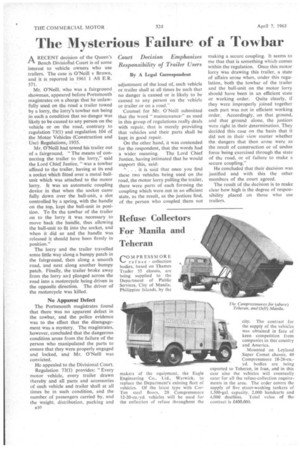The Mysterious Failure of a Towbar
Page 104

If you've noticed an error in this article please click here to report it so we can fix it.
Court Decision Emphasizes Responsibility of Trailer Users
By A Legal Correspondent
A RECENT decision of the Queen's r-sBench Divisional Court is of some interest to vehicle owners who use trailers. The case is O'Neill v Brown, and it is reported in 1961 1 All ER. 571.
Mr. O'Neill, who was a fairground showman, appeared before Portsmouth magistrates on a charge that he unlawfully used on the road a trailer towed by a lorry, the lorry's towbar not being in such a condition that no danger was likely to be caused to any person on the vehicle or on the road, contrary to regulation 73(1) and regulation 104 of the Motor Vehicles (Construction and Use) Regulations, 1955.
Mr. O'Neill had towed his trailer out of a fairground. "The means of connecting the trailer to the lorry," said the Lord Chief Justice, "was a towbar affixed to the trailer, having at its end a socket which fitted over a metal ballunit which was attached to the motor lorry. It was an automatic coupling device in that when the socket came fully down over the ball-unit, a slot controlled by a spring, with the handle on the top, kept the ball-unit in position. To fix the towbar of the trailer on to the lorry it was necessary to move back the handle, thus allowing the ball-unit to fit into the socket, and when it did so and the handle was released it should have been firmly in position."
The lorry and the trailer travelled some little way along a bumpy patch in the fairground, then along a smooth road, and next along another bumpy patch. Finally, the trailer broke away from the lorry and plunged across the road into a motorcycle being driven in the opposite direction. The driver of the motorcycle was killed.
No Apparent Defect
The Portsmouth magistrates found that there was no apparent defect in the towbar, and the police evidence was to the effect that the disengagement was a mystery. The magistrates, however, concluded that the dangerous condition arose from the failure of the person who manipulated the parts to ensure that they were properly engaged and locked, and Mr. O'Neill was convicted.
He appealed to the Divisional Court.
Regulation 73(1) provides: "Every motor vehicle, every trailer drawn thereby and all parts and accessories of such vehicle and trailer shall at all times be in such condition, and the number of passengers carried by, and the weight. distribution, packing and a30
adjustment of the load of, such vehicle or trailer shall at all times be such that no danger is caused or is likely to be caused to any person on the vehicle or trailer or on a road."
Counsel for Mr. O'Neill submitted that the word "maintenance" as used in this group of regulations really deals with repair, that is merely providing that vehicles and their parts shall be kept in good repair.
On the other hand, it was contended for the respondent, that the words had a wider meaning. The Lord Chief Justice, having intimated that he would support this, said:
. it is said that once you find these two vehicles being used on the road, the motor lorry pulling the trailer, there were parts of each forming the coupling which were not in an efficient state, as the result, as the justices find, of the person who coupled _them not
making a secure coupling. It seems to me that that is something which comes within the regulation. Once this motor lorry was drawing this trailer, a state of affairs arose when, under this regulation, both the towbar of the trailer and the ball-unit on the motor lorry should have been in an efficient state or working order. Quite clearly, if they were improperly joined together each part was not in efficient working order. Accordingly, on that ground, and that ground alone, the justices were right in their determination. They decided this case on the basis that it did not in their view matter whether the dangers that then arose were as the result of construction or of undue force being exercised through the state of the road, or of failure to make a secure coupling," He concluded that their decision was justified and with this the other members of the court agreed.
The result of the decision is to make clear how high is the degree of responsibility placed on those who use trailers.




























































































































































